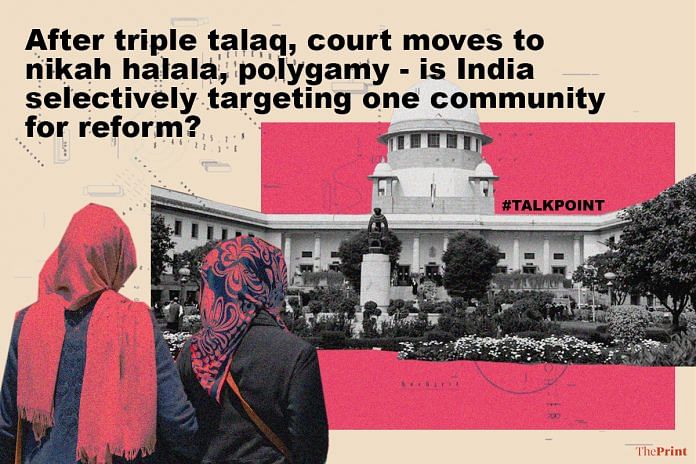Seven months after declaring triple talaq unconstitutional, the Supreme Court has decided to set up a Constitution bench to rule on the Muslim practices of polygamy and nikah halala. The SC has asked the Centre to clarify its position on the issue.
ThePrint asks: After triple talaq, court moves to nikah halala, polygamy — is India selectively targeting one community for reform?
It suits religious leaders, parties & govt to do politics at the cost of Muslim women
 Zakia Soman
Zakia Soman
Founder, Bharatiya Muslim Mahila Andolan
India needs comprehensive reform in Muslim personal law. This would be in keeping with the reform in the personal laws of Hindus and Christians. Laws such as the Hindu Marriage Act, the Hindu Succession Act, and the Christian Marriage Act were formed and amended periodically to enable gender justice in marriage and family.
The resistance to reform from conservative sections in the Muslim community has led to women being denied their Quranic rights in matters of marriage and family. Triple talaq, halala and polygamy are the most glaring examples of this denial. In our petition in the Supreme Court, we have prayed for relief from these, and all the women survivors, too, have pleaded for an end to triple talaq, nikah halala and polygamy.
Gender justice is a fundamental principle of Islam, but the dominance of patriarchal elements in matters of personal law has led to injustice to women. We need to look at the issue from the prism of gender justice, and women’s Quranic as well as constitutional rights.
The conservative elements are labeling this a ploy of the Hindu Right, but let us remember the latter are only trying to take advantage of the situation. The community leadership being in denial about the issue does not help the situation. Political parties will try to benefit in keeping with their respective political ideologies.
We need a codified Muslim family law based on the Quran and conforming with the constitutional principles guaranteeing women protection. We have worked on the draft of such a law for the last 10 years, for which we have talked to over 50,000 Muslim women, scholars, lawyers, community members, experts etc.
We want the age of marriage to be 18 and 21 years for women and men, respectively; the talaq-e-ehsan to be the method of divorce; polygamy to be made illegal; and mehr to be a tangible right. We want equal share for women in property. These are all based on Quranic injunctions and are evidently in keeping with the democratic principles enshrined in the Constitution. But, unfortunately, in our country, there is more politics and less gender justice. It suits everyone — Muslim religious leaders, political parties, government — to do politics at the cost of Muslim women.
Hiding behind ‘tradition’ cannot justify nikah halala, it is an abomination
 Raghav Awasthi
Raghav Awasthi
RSS member and advocate
I think the proposition, as framed, is not just problematic but quite cringe-worthy. It’s a sad travesty to say that the criticism in court of discriminatory practices against Muslim women (by Muslim women themselves, for the most part) amounts to “targeting”. It also suspiciously sounds like an attempt to stoke victimhood.
Muslim women are equal citizens of the country and all the rights under Part III of the Constitution are available to them. The other remarkable feature of our Constitution, especially Part III, is that it focuses on ensuring rights to individuals. Article 13 very clearly lays down that any custom that violates the rights granted to individuals under the Constitution has to be set aside.
Since the legal position is clear, the only question that remains is, which class of people would wish to keep Muslim women backward? The answer is, regressive Muslim men. It is really sad that a headline like this has been framed that plays into the hands of the latter.
Nikah halala is an abomination and no amount of sophistry or hiding behind ‘tradition’ can justify this. One expects a ‘liberal’ publication like this one to take a stand against all such practices, irrespective of whether they are being practised by the majority or the minority community, so that the letter and spirit of our Constitution is upheld to the fullest possible extent and even beyond that.
Polygamy is far more rampant among Hindus despite a law criminalising it
 Saumya Saxena
Saumya Saxena
Legal historian, family law scholar and independent consultant to the Law Commission
The triple talaq judgment was largely welcomed by citizens, though one cannot say the same about the subsequent Bill. Similarly, of the four petitions challenging nikah halala and polygamy, three are by women, even if the fourth is a frivolous one filed by a party’s lawyer. I doubt one would find support for a practice such as nikah halala even if the debate were framed within the community. Many clerics hold that the practice was never meant to take its present shape, and that, with the curbing of triple talaq, the instances of nikah halala should fall.
Questioning polygamy does not amount to selective targeting of the Muslim community, for it is far more rampant among Hindus despite a law criminalising it. We can only hope that the courts include practices such as maitri karar and nata pratha when the practice is being addressed. A number of Muslim countries, including Pakistan, have regulated the practice of polygamy, but, informally, such arrangements do prevail. In the US, too, there are communities that practice polygamy. The idea that major democracies have a uniform civil code is a myth.
There is also a petition challenging the divorce procedure among Parsis. It may be time we started to reconcile personal laws with constitutional principles. That way, we protect the ‘difference’, but not ‘discrimination’. Therefore, even if one does not have a moral position on polygamy, the fact that it is an exclusive right of men is a good enough reason for judicial intervention.
(Views are personal)
The cases before the Supreme Court are legal battles to demonize Muslims
 Faizan Mustafa
Faizan Mustafa
Vice-chancellor, NALSAR University of Law, Hyderabad
Yet another PIL on Muslim law devoid of serious argument has been admitted in court.
Thus, an impression is gaining ground that while petitions on serious matters involving real questions about the interpretation of the Constitution are admitted after much persuasion and difficulty, notices are promptly issued on those against Muslim law.
Perception and people’s faith are crucial to the justice process. A wrong perception is fast gaining ground among the less-educated masses as issues about Muslims do have a polarising effect that works in the favour of Rightist forces. There are a number of discriminatory provisions under the Hindu law as well — namely, kanyadaan, the wife is still not coparcener, an issueless wife’s self-acquired property goes to her in-laws, not her parents, etc — but no one goes against them.
True, since the original reference did allude to the constitutionality of nikah halala and polygamy, the CJI-led bench had little choice in the matter, but only the educated elite will appreciate this.
Some of the assertions in the petition are funny. It has equated halala with rape without realising that there is nothing like halala in Islam. Marriage takes place with the consent of the wife and she is free not to marry the man who divorced her. Any talk of subsequent divorce is already illegal in Islam. The Prophet himself has cursed such a union. The practice of mutah (a form of temporary marriage) is illegal in most Muslim sects as well. In any case, no law prohibits consensual sex.
Polygamy is nothing more than a rare exception. There is no mention of any study indicating Muslims are more bigamous than Hindus.
This selective targeting is good, Muslim women will finally get constitutional respite
 Talha Ashraf
Talha Ashraf
Journalist, ThePrint
Yes, it is the selective targeting of a community for reform. But this selective targeting has taken too long; it should have accompanied the reformist Hindu code bills in the 1950s.
Of course, the intention of the BJP government is not to be the saviour of Muslim women. It is just fulfilling its mandate to strip the Muslim men of their privileges — the patriarchal privileges guaranteed by the Constitution that Hindu men don’t enjoy.
In fact, Hindu communalist factions support a uniform civil code, as opposed to personal laws, because they want to remove the privileges of minority men. Hindu ideologues who seek a uniform civil code would still resist reform of personal laws that might empower Hindu women.
But the outcome of the exercise would be constitutional respite for Muslim women deprived of equal rights.
After years of appeasement of Muslim clergy, the Indian government has put its foot on the pedal regarding Muslim personal law reforms.
We may debate the right time and intentions for such reforms, but the truth is the progressive forces of this country have failed the Muslim women.
Seventy years is a long enough time to achieve “consensus” in the Muslim community for personal law reforms. It is time to use the hard hand of the state.
Compiled by Deeksha Bhardwaj, Journalist at ThePrint.




As far the Mutah marriage is concerned, it finds its nidus in the holy Quran itself. Mutah marriage, which is allowed in Shia school of thought in Islam, is a temporary marriage with all the incidences of a permanent marriage except in Mutah Marriage spouses don’t have the right of each other’s property. But the child born out of it is legitimate, and will share the inheritance from his parents.
In a society, where consensual sex is not prohibited, where the Apex Court has recognised live in relationship, I really don’t understand the hypocrisy of filing a petition to ban Mutah Marriage along with polygamy and nikah Halala.
Indeed, in Mutah Marriage, period is fixed, but it can never be compared with prostitution as there is no legal repercussions after the consummation in prostitution. A child of a prostitute will always be an illegitimate, this society will never accept him. But in case of Mutah, a child is as legitimate as it is in regular Marriage.
Mutah Marriage is always happened with the consent of both the parties. In live in relationship cases, many couples live together and part ways after spending considerable time when they find each other incompatible. But nobody does question it.
Also in Nikah Mutah, if they spend time beyond the fixed period, the marriage ultimately becomes regular and wife becomes entitled for all the benefits of husband.
I don’t know why a particular section in the society is being hounded. This has to be stopped.
The framing of the Talk Point is itself a talk point, for it exposes minoritism passing off as being liberal. It is the Supreme Court of the country that has taken up the issues relating to rights of Muslim women. It is very shocking on part of The Print to insinuate that the Supreme Court is targeting Muslims.
News reports on 26 March , 2018 say that on a petition filed against practice of Polygamy and Nikah Halala in Islam , SC has issued notice to the concerned respondents to reply. While the issue may take time for final outcome , it may be apt to know this Vedic astrology writer’s related prediction in article – “ Astrologically speaking , some highlights for India in coming year 2018” – published at theindiapost.com , simultaneously at wionews.com last year on 19 October , 2017 , as follows :-
“ (3) The year 2018 looks to be bringing to focus themes of political , religious or political nature for a heightened or sharp analysis or discussion. Such analysis or discussion could also pave way for new enactments or judicial pronouncements having far reaching significance or value , covering issues related to women , religion and political class”.